Business Taxation Theory and Practice: Developments and Issues for BP
VerifiedAdded on 2021/04/16
|10
|2278
|453
Report
AI Summary
This report provides an overview of recent developments in corporate taxation, focusing on their implications for British Petroleum (BP). It analyzes key reforms, including changes to corporate tax rates, loss utilization rules, and interest deductions. The report examines the impact of these changes, including the Base Erosion and Profit Shifting (BEPS) project, on BP's operations and its stakeholders, such as auditors and non-governmental organizations. It discusses the importance of tax transparency and the potential reputational risks associated with tax planning. The report also explores the implications of these changes for stakeholders and the overall landscape of corporate taxation. The report concludes by emphasizing the need for aligning tax profits with economic substance, and acknowledges the limitations of the BEPS project.
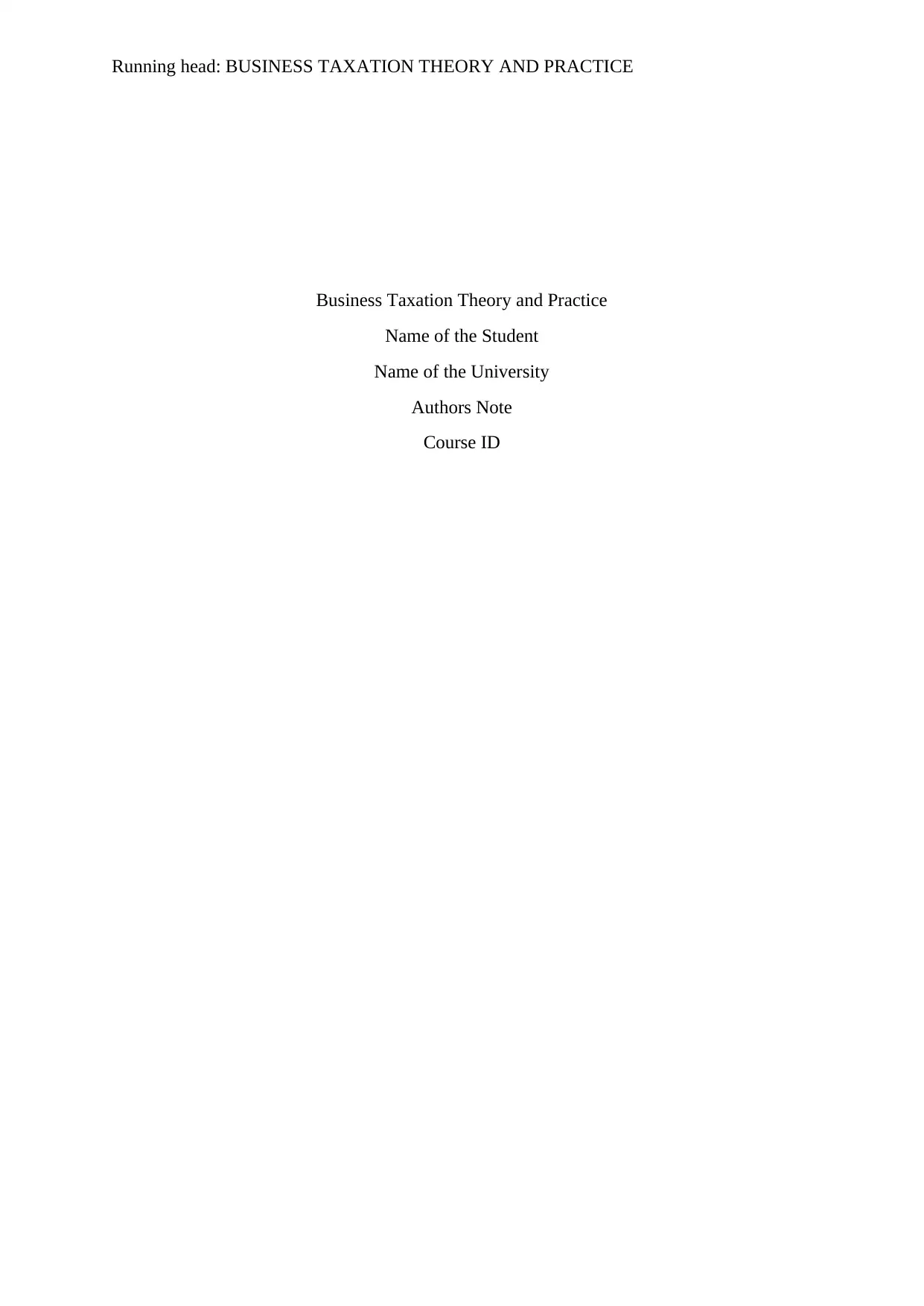
Running head: BUSINESS TAXATION THEORY AND PRACTICE
Business Taxation Theory and Practice
Name of the Student
Name of the University
Authors Note
Course ID
Business Taxation Theory and Practice
Name of the Student
Name of the University
Authors Note
Course ID
Paraphrase This Document
Need a fresh take? Get an instant paraphrase of this document with our AI Paraphraser
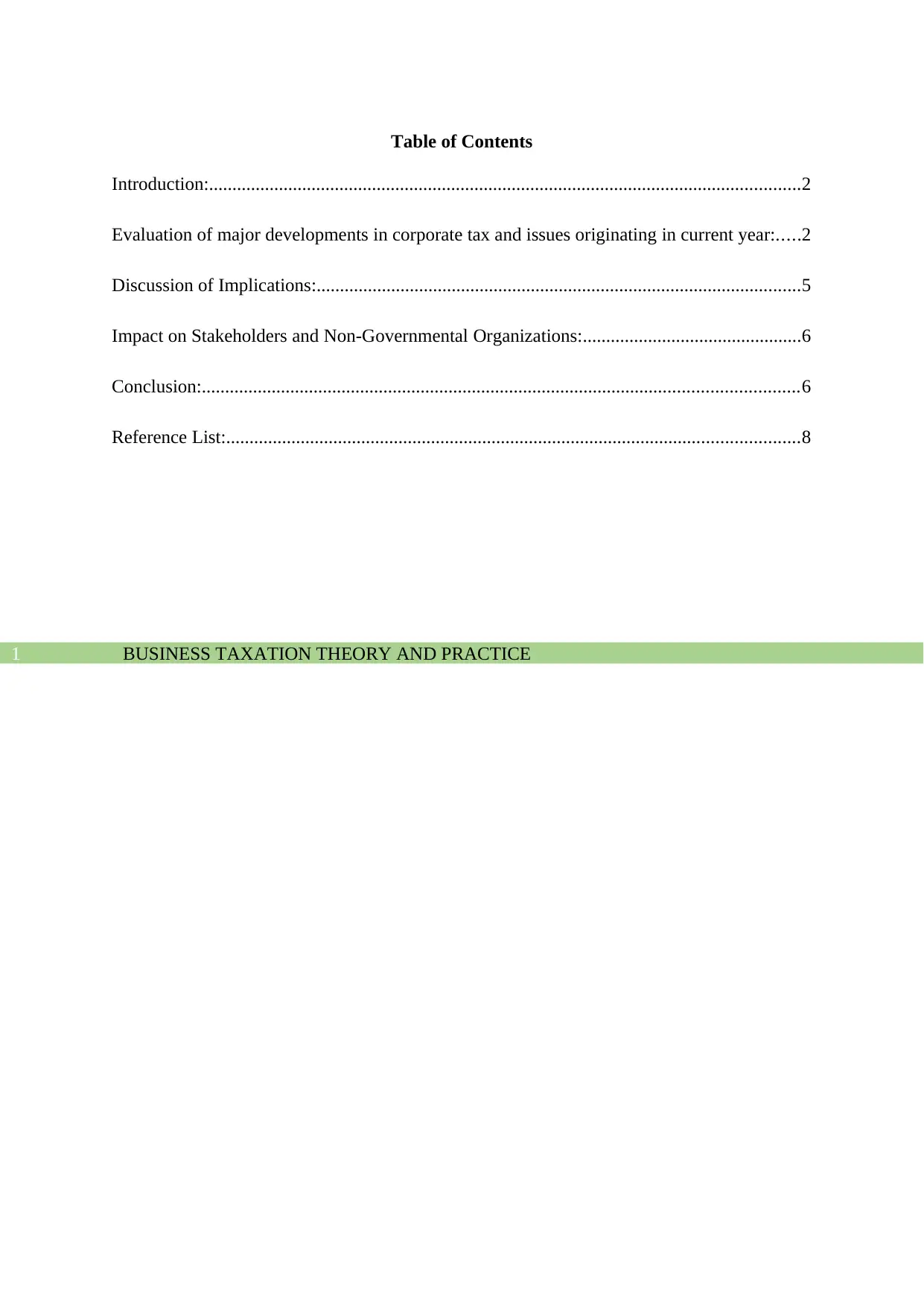
BUSINESS TAXATION THEORY AND PRACTICE1
Table of Contents
Introduction:...............................................................................................................................2
Evaluation of major developments in corporate tax and issues originating in current year:.....2
Discussion of Implications:........................................................................................................5
Impact on Stakeholders and Non-Governmental Organizations:...............................................6
Conclusion:................................................................................................................................6
Reference List:...........................................................................................................................8
Table of Contents
Introduction:...............................................................................................................................2
Evaluation of major developments in corporate tax and issues originating in current year:.....2
Discussion of Implications:........................................................................................................5
Impact on Stakeholders and Non-Governmental Organizations:...............................................6
Conclusion:................................................................................................................................6
Reference List:...........................................................................................................................8
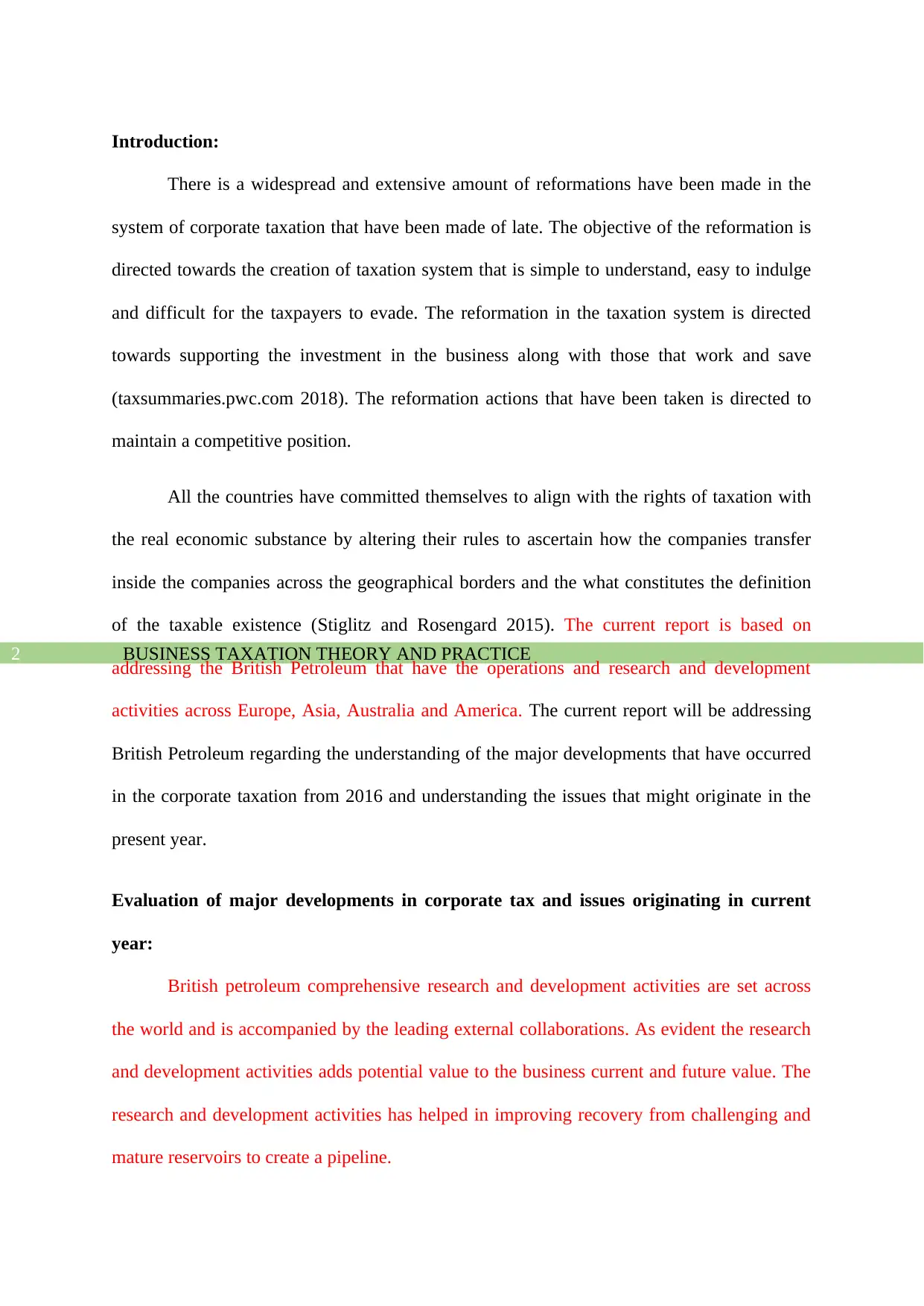
BUSINESS TAXATION THEORY AND PRACTICE2
Introduction:
There is a widespread and extensive amount of reformations have been made in the
system of corporate taxation that have been made of late. The objective of the reformation is
directed towards the creation of taxation system that is simple to understand, easy to indulge
and difficult for the taxpayers to evade. The reformation in the taxation system is directed
towards supporting the investment in the business along with those that work and save
(taxsummaries.pwc.com 2018). The reformation actions that have been taken is directed to
maintain a competitive position.
All the countries have committed themselves to align with the rights of taxation with
the real economic substance by altering their rules to ascertain how the companies transfer
inside the companies across the geographical borders and the what constitutes the definition
of the taxable existence (Stiglitz and Rosengard 2015). The current report is based on
addressing the British Petroleum that have the operations and research and development
activities across Europe, Asia, Australia and America. The current report will be addressing
British Petroleum regarding the understanding of the major developments that have occurred
in the corporate taxation from 2016 and understanding the issues that might originate in the
present year.
Evaluation of major developments in corporate tax and issues originating in current
year:
British petroleum comprehensive research and development activities are set across
the world and is accompanied by the leading external collaborations. As evident the research
and development activities adds potential value to the business current and future value. The
research and development activities has helped in improving recovery from challenging and
mature reservoirs to create a pipeline.
Introduction:
There is a widespread and extensive amount of reformations have been made in the
system of corporate taxation that have been made of late. The objective of the reformation is
directed towards the creation of taxation system that is simple to understand, easy to indulge
and difficult for the taxpayers to evade. The reformation in the taxation system is directed
towards supporting the investment in the business along with those that work and save
(taxsummaries.pwc.com 2018). The reformation actions that have been taken is directed to
maintain a competitive position.
All the countries have committed themselves to align with the rights of taxation with
the real economic substance by altering their rules to ascertain how the companies transfer
inside the companies across the geographical borders and the what constitutes the definition
of the taxable existence (Stiglitz and Rosengard 2015). The current report is based on
addressing the British Petroleum that have the operations and research and development
activities across Europe, Asia, Australia and America. The current report will be addressing
British Petroleum regarding the understanding of the major developments that have occurred
in the corporate taxation from 2016 and understanding the issues that might originate in the
present year.
Evaluation of major developments in corporate tax and issues originating in current
year:
British petroleum comprehensive research and development activities are set across
the world and is accompanied by the leading external collaborations. As evident the research
and development activities adds potential value to the business current and future value. The
research and development activities has helped in improving recovery from challenging and
mature reservoirs to create a pipeline.
⊘ This is a preview!⊘
Do you want full access?
Subscribe today to unlock all pages.

Trusted by 1+ million students worldwide
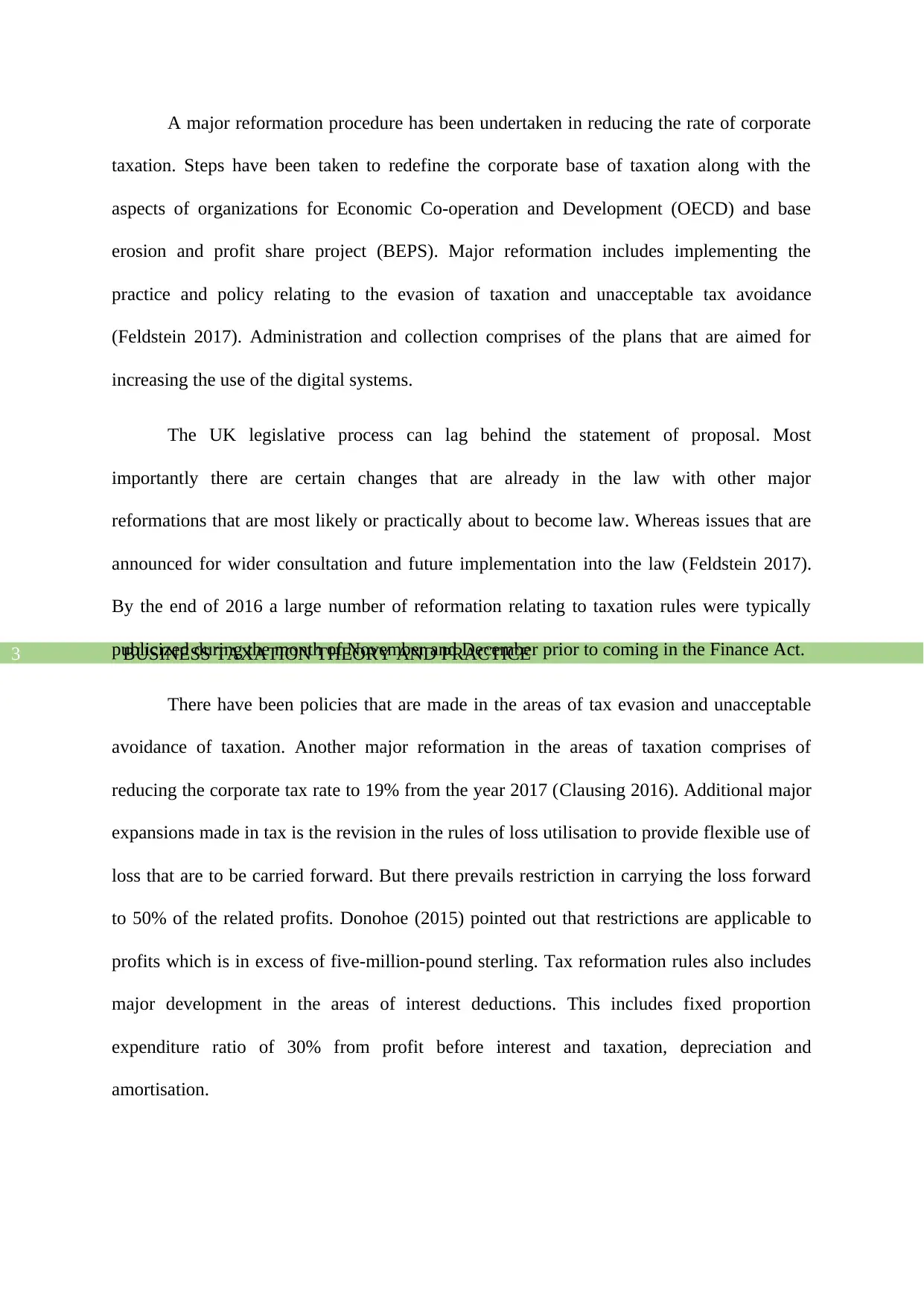
BUSINESS TAXATION THEORY AND PRACTICE3
A major reformation procedure has been undertaken in reducing the rate of corporate
taxation. Steps have been taken to redefine the corporate base of taxation along with the
aspects of organizations for Economic Co-operation and Development (OECD) and base
erosion and profit share project (BEPS). Major reformation includes implementing the
practice and policy relating to the evasion of taxation and unacceptable tax avoidance
(Feldstein 2017). Administration and collection comprises of the plans that are aimed for
increasing the use of the digital systems.
The UK legislative process can lag behind the statement of proposal. Most
importantly there are certain changes that are already in the law with other major
reformations that are most likely or practically about to become law. Whereas issues that are
announced for wider consultation and future implementation into the law (Feldstein 2017).
By the end of 2016 a large number of reformation relating to taxation rules were typically
publicized during the month of November and December prior to coming in the Finance Act.
There have been policies that are made in the areas of tax evasion and unacceptable
avoidance of taxation. Another major reformation in the areas of taxation comprises of
reducing the corporate tax rate to 19% from the year 2017 (Clausing 2016). Additional major
expansions made in tax is the revision in the rules of loss utilisation to provide flexible use of
loss that are to be carried forward. But there prevails restriction in carrying the loss forward
to 50% of the related profits. Donohoe (2015) pointed out that restrictions are applicable to
profits which is in excess of five-million-pound sterling. Tax reformation rules also includes
major development in the areas of interest deductions. This includes fixed proportion
expenditure ratio of 30% from profit before interest and taxation, depreciation and
amortisation.
A major reformation procedure has been undertaken in reducing the rate of corporate
taxation. Steps have been taken to redefine the corporate base of taxation along with the
aspects of organizations for Economic Co-operation and Development (OECD) and base
erosion and profit share project (BEPS). Major reformation includes implementing the
practice and policy relating to the evasion of taxation and unacceptable tax avoidance
(Feldstein 2017). Administration and collection comprises of the plans that are aimed for
increasing the use of the digital systems.
The UK legislative process can lag behind the statement of proposal. Most
importantly there are certain changes that are already in the law with other major
reformations that are most likely or practically about to become law. Whereas issues that are
announced for wider consultation and future implementation into the law (Feldstein 2017).
By the end of 2016 a large number of reformation relating to taxation rules were typically
publicized during the month of November and December prior to coming in the Finance Act.
There have been policies that are made in the areas of tax evasion and unacceptable
avoidance of taxation. Another major reformation in the areas of taxation comprises of
reducing the corporate tax rate to 19% from the year 2017 (Clausing 2016). Additional major
expansions made in tax is the revision in the rules of loss utilisation to provide flexible use of
loss that are to be carried forward. But there prevails restriction in carrying the loss forward
to 50% of the related profits. Donohoe (2015) pointed out that restrictions are applicable to
profits which is in excess of five-million-pound sterling. Tax reformation rules also includes
major development in the areas of interest deductions. This includes fixed proportion
expenditure ratio of 30% from profit before interest and taxation, depreciation and
amortisation.
Paraphrase This Document
Need a fresh take? Get an instant paraphrase of this document with our AI Paraphraser
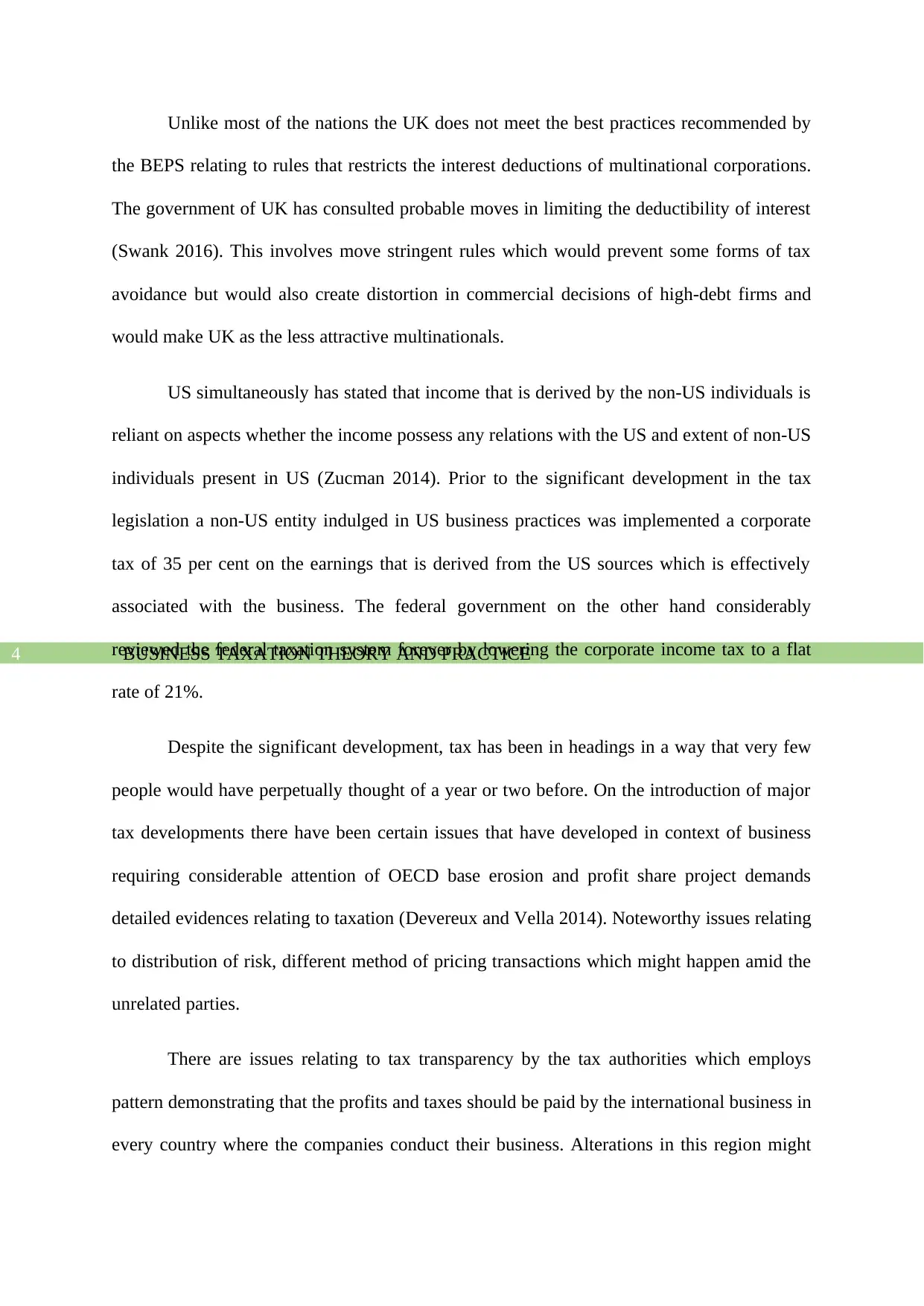
BUSINESS TAXATION THEORY AND PRACTICE4
Unlike most of the nations the UK does not meet the best practices recommended by
the BEPS relating to rules that restricts the interest deductions of multinational corporations.
The government of UK has consulted probable moves in limiting the deductibility of interest
(Swank 2016). This involves move stringent rules which would prevent some forms of tax
avoidance but would also create distortion in commercial decisions of high-debt firms and
would make UK as the less attractive multinationals.
US simultaneously has stated that income that is derived by the non-US individuals is
reliant on aspects whether the income possess any relations with the US and extent of non-US
individuals present in US (Zucman 2014). Prior to the significant development in the tax
legislation a non-US entity indulged in US business practices was implemented a corporate
tax of 35 per cent on the earnings that is derived from the US sources which is effectively
associated with the business. The federal government on the other hand considerably
reviewed the federal taxation system forever by lowering the corporate income tax to a flat
rate of 21%.
Despite the significant development, tax has been in headings in a way that very few
people would have perpetually thought of a year or two before. On the introduction of major
tax developments there have been certain issues that have developed in context of business
requiring considerable attention of OECD base erosion and profit share project demands
detailed evidences relating to taxation (Devereux and Vella 2014). Noteworthy issues relating
to distribution of risk, different method of pricing transactions which might happen amid the
unrelated parties.
There are issues relating to tax transparency by the tax authorities which employs
pattern demonstrating that the profits and taxes should be paid by the international business in
every country where the companies conduct their business. Alterations in this region might
Unlike most of the nations the UK does not meet the best practices recommended by
the BEPS relating to rules that restricts the interest deductions of multinational corporations.
The government of UK has consulted probable moves in limiting the deductibility of interest
(Swank 2016). This involves move stringent rules which would prevent some forms of tax
avoidance but would also create distortion in commercial decisions of high-debt firms and
would make UK as the less attractive multinationals.
US simultaneously has stated that income that is derived by the non-US individuals is
reliant on aspects whether the income possess any relations with the US and extent of non-US
individuals present in US (Zucman 2014). Prior to the significant development in the tax
legislation a non-US entity indulged in US business practices was implemented a corporate
tax of 35 per cent on the earnings that is derived from the US sources which is effectively
associated with the business. The federal government on the other hand considerably
reviewed the federal taxation system forever by lowering the corporate income tax to a flat
rate of 21%.
Despite the significant development, tax has been in headings in a way that very few
people would have perpetually thought of a year or two before. On the introduction of major
tax developments there have been certain issues that have developed in context of business
requiring considerable attention of OECD base erosion and profit share project demands
detailed evidences relating to taxation (Devereux and Vella 2014). Noteworthy issues relating
to distribution of risk, different method of pricing transactions which might happen amid the
unrelated parties.
There are issues relating to tax transparency by the tax authorities which employs
pattern demonstrating that the profits and taxes should be paid by the international business in
every country where the companies conduct their business. Alterations in this region might
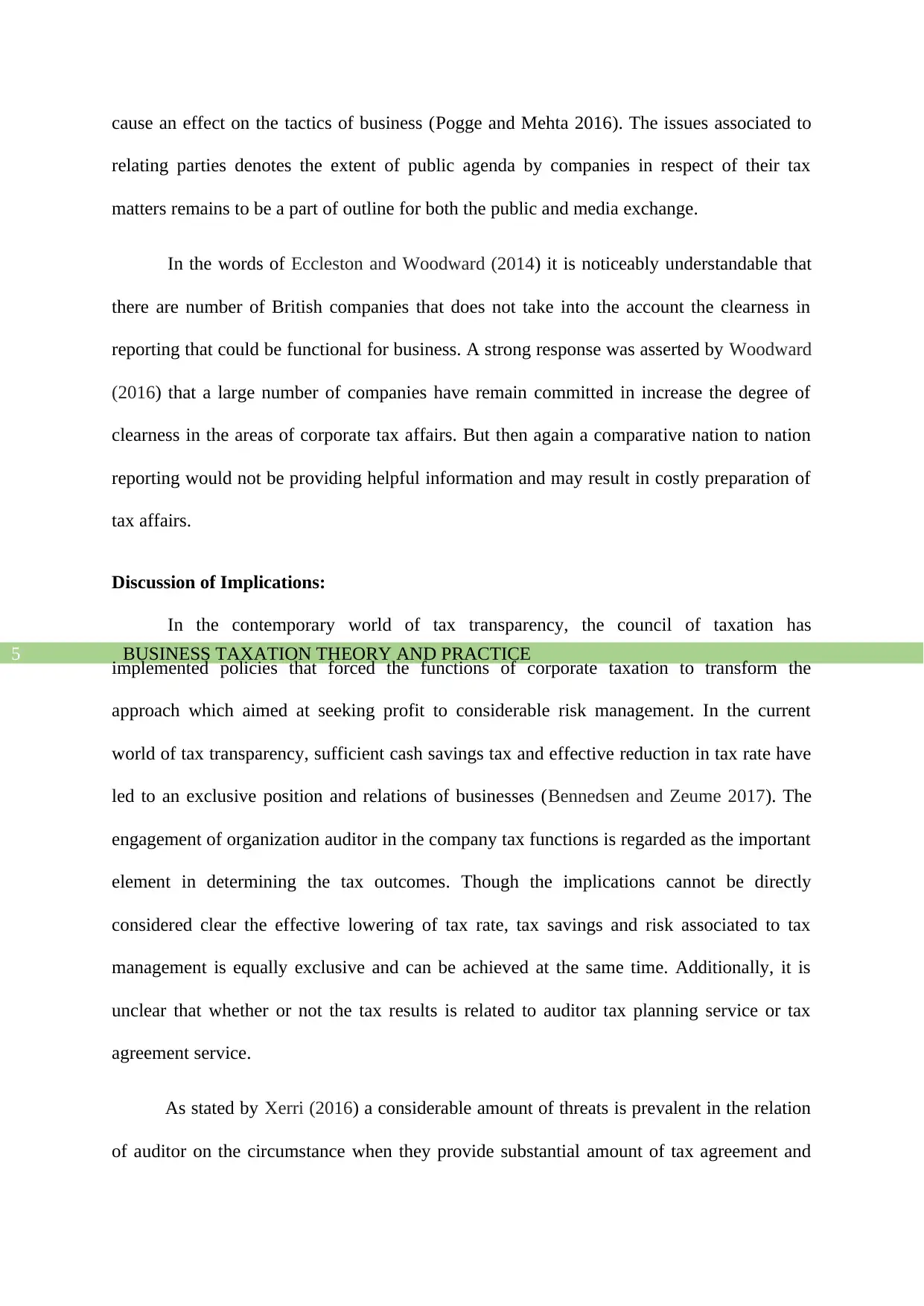
BUSINESS TAXATION THEORY AND PRACTICE5
cause an effect on the tactics of business (Pogge and Mehta 2016). The issues associated to
relating parties denotes the extent of public agenda by companies in respect of their tax
matters remains to be a part of outline for both the public and media exchange.
In the words of Eccleston and Woodward (2014) it is noticeably understandable that
there are number of British companies that does not take into the account the clearness in
reporting that could be functional for business. A strong response was asserted by Woodward
(2016) that a large number of companies have remain committed in increase the degree of
clearness in the areas of corporate tax affairs. But then again a comparative nation to nation
reporting would not be providing helpful information and may result in costly preparation of
tax affairs.
Discussion of Implications:
In the contemporary world of tax transparency, the council of taxation has
implemented policies that forced the functions of corporate taxation to transform the
approach which aimed at seeking profit to considerable risk management. In the current
world of tax transparency, sufficient cash savings tax and effective reduction in tax rate have
led to an exclusive position and relations of businesses (Bennedsen and Zeume 2017). The
engagement of organization auditor in the company tax functions is regarded as the important
element in determining the tax outcomes. Though the implications cannot be directly
considered clear the effective lowering of tax rate, tax savings and risk associated to tax
management is equally exclusive and can be achieved at the same time. Additionally, it is
unclear that whether or not the tax results is related to auditor tax planning service or tax
agreement service.
As stated by Xerri (2016) a considerable amount of threats is prevalent in the relation
of auditor on the circumstance when they provide substantial amount of tax agreement and
cause an effect on the tactics of business (Pogge and Mehta 2016). The issues associated to
relating parties denotes the extent of public agenda by companies in respect of their tax
matters remains to be a part of outline for both the public and media exchange.
In the words of Eccleston and Woodward (2014) it is noticeably understandable that
there are number of British companies that does not take into the account the clearness in
reporting that could be functional for business. A strong response was asserted by Woodward
(2016) that a large number of companies have remain committed in increase the degree of
clearness in the areas of corporate tax affairs. But then again a comparative nation to nation
reporting would not be providing helpful information and may result in costly preparation of
tax affairs.
Discussion of Implications:
In the contemporary world of tax transparency, the council of taxation has
implemented policies that forced the functions of corporate taxation to transform the
approach which aimed at seeking profit to considerable risk management. In the current
world of tax transparency, sufficient cash savings tax and effective reduction in tax rate have
led to an exclusive position and relations of businesses (Bennedsen and Zeume 2017). The
engagement of organization auditor in the company tax functions is regarded as the important
element in determining the tax outcomes. Though the implications cannot be directly
considered clear the effective lowering of tax rate, tax savings and risk associated to tax
management is equally exclusive and can be achieved at the same time. Additionally, it is
unclear that whether or not the tax results is related to auditor tax planning service or tax
agreement service.
As stated by Xerri (2016) a considerable amount of threats is prevalent in the relation
of auditor on the circumstance when they provide substantial amount of tax agreement and
⊘ This is a preview!⊘
Do you want full access?
Subscribe today to unlock all pages.

Trusted by 1+ million students worldwide
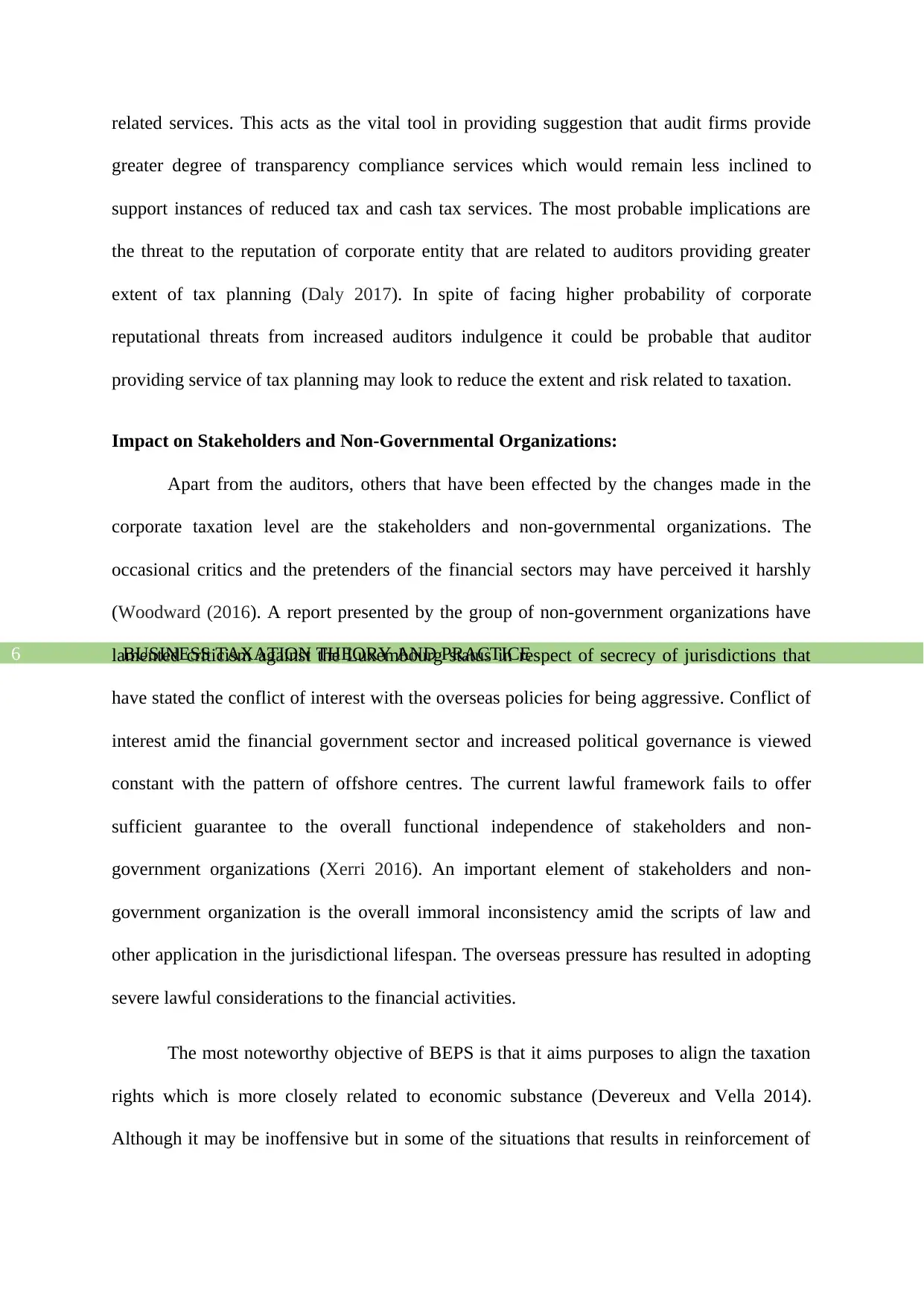
BUSINESS TAXATION THEORY AND PRACTICE6
related services. This acts as the vital tool in providing suggestion that audit firms provide
greater degree of transparency compliance services which would remain less inclined to
support instances of reduced tax and cash tax services. The most probable implications are
the threat to the reputation of corporate entity that are related to auditors providing greater
extent of tax planning (Daly 2017). In spite of facing higher probability of corporate
reputational threats from increased auditors indulgence it could be probable that auditor
providing service of tax planning may look to reduce the extent and risk related to taxation.
Impact on Stakeholders and Non-Governmental Organizations:
Apart from the auditors, others that have been effected by the changes made in the
corporate taxation level are the stakeholders and non-governmental organizations. The
occasional critics and the pretenders of the financial sectors may have perceived it harshly
(Woodward (2016). A report presented by the group of non-government organizations have
lamented criticism against the Luxembourg status in respect of secrecy of jurisdictions that
have stated the conflict of interest with the overseas policies for being aggressive. Conflict of
interest amid the financial government sector and increased political governance is viewed
constant with the pattern of offshore centres. The current lawful framework fails to offer
sufficient guarantee to the overall functional independence of stakeholders and non-
government organizations (Xerri 2016). An important element of stakeholders and non-
government organization is the overall immoral inconsistency amid the scripts of law and
other application in the jurisdictional lifespan. The overseas pressure has resulted in adopting
severe lawful considerations to the financial activities.
The most noteworthy objective of BEPS is that it aims purposes to align the taxation
rights which is more closely related to economic substance (Devereux and Vella 2014).
Although it may be inoffensive but in some of the situations that results in reinforcement of
related services. This acts as the vital tool in providing suggestion that audit firms provide
greater degree of transparency compliance services which would remain less inclined to
support instances of reduced tax and cash tax services. The most probable implications are
the threat to the reputation of corporate entity that are related to auditors providing greater
extent of tax planning (Daly 2017). In spite of facing higher probability of corporate
reputational threats from increased auditors indulgence it could be probable that auditor
providing service of tax planning may look to reduce the extent and risk related to taxation.
Impact on Stakeholders and Non-Governmental Organizations:
Apart from the auditors, others that have been effected by the changes made in the
corporate taxation level are the stakeholders and non-governmental organizations. The
occasional critics and the pretenders of the financial sectors may have perceived it harshly
(Woodward (2016). A report presented by the group of non-government organizations have
lamented criticism against the Luxembourg status in respect of secrecy of jurisdictions that
have stated the conflict of interest with the overseas policies for being aggressive. Conflict of
interest amid the financial government sector and increased political governance is viewed
constant with the pattern of offshore centres. The current lawful framework fails to offer
sufficient guarantee to the overall functional independence of stakeholders and non-
government organizations (Xerri 2016). An important element of stakeholders and non-
government organization is the overall immoral inconsistency amid the scripts of law and
other application in the jurisdictional lifespan. The overseas pressure has resulted in adopting
severe lawful considerations to the financial activities.
The most noteworthy objective of BEPS is that it aims purposes to align the taxation
rights which is more closely related to economic substance (Devereux and Vella 2014).
Although it may be inoffensive but in some of the situations that results in reinforcement of
Paraphrase This Document
Need a fresh take? Get an instant paraphrase of this document with our AI Paraphraser
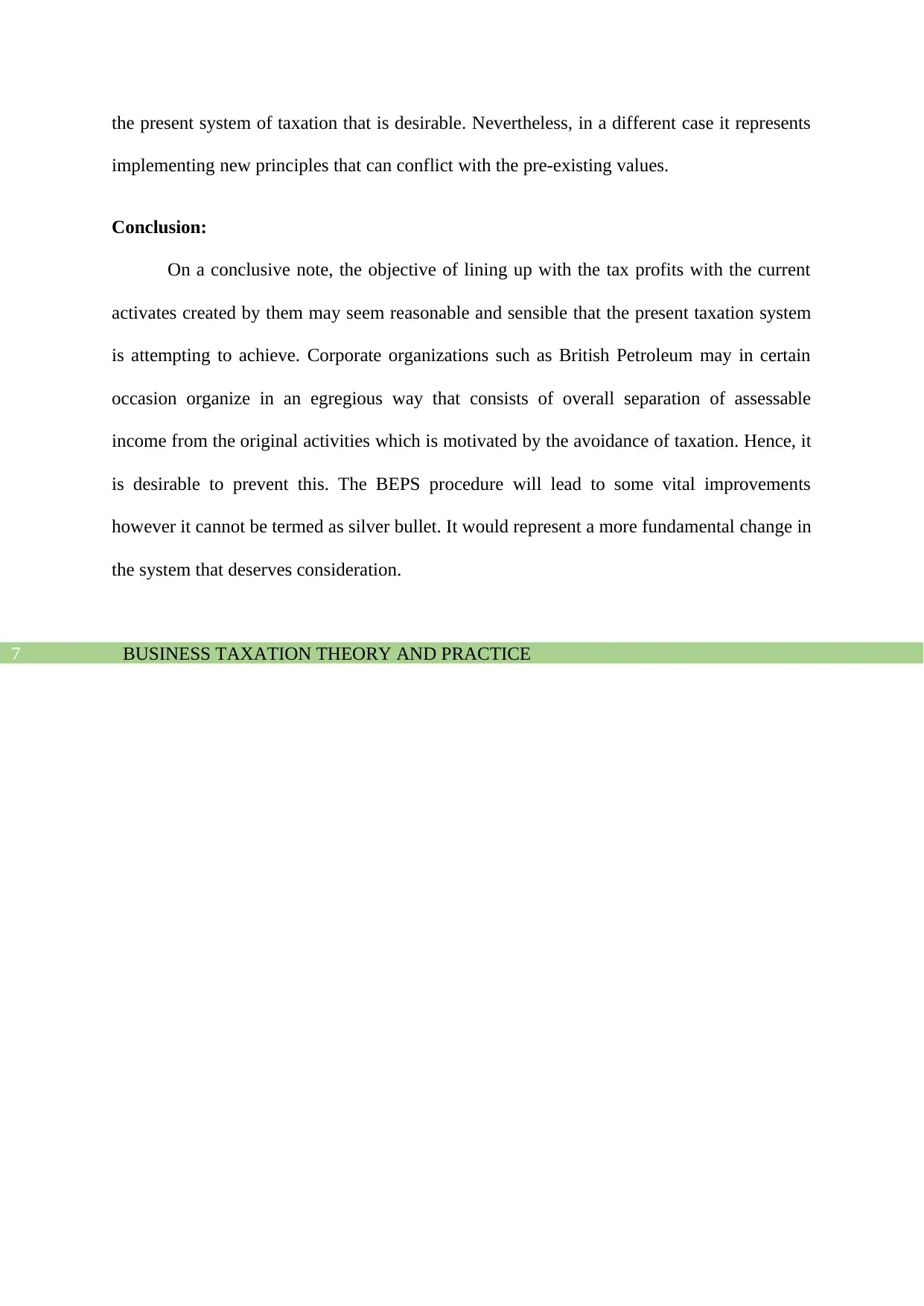
BUSINESS TAXATION THEORY AND PRACTICE7
the present system of taxation that is desirable. Nevertheless, in a different case it represents
implementing new principles that can conflict with the pre-existing values.
Conclusion:
On a conclusive note, the objective of lining up with the tax profits with the current
activates created by them may seem reasonable and sensible that the present taxation system
is attempting to achieve. Corporate organizations such as British Petroleum may in certain
occasion organize in an egregious way that consists of overall separation of assessable
income from the original activities which is motivated by the avoidance of taxation. Hence, it
is desirable to prevent this. The BEPS procedure will lead to some vital improvements
however it cannot be termed as silver bullet. It would represent a more fundamental change in
the system that deserves consideration.
the present system of taxation that is desirable. Nevertheless, in a different case it represents
implementing new principles that can conflict with the pre-existing values.
Conclusion:
On a conclusive note, the objective of lining up with the tax profits with the current
activates created by them may seem reasonable and sensible that the present taxation system
is attempting to achieve. Corporate organizations such as British Petroleum may in certain
occasion organize in an egregious way that consists of overall separation of assessable
income from the original activities which is motivated by the avoidance of taxation. Hence, it
is desirable to prevent this. The BEPS procedure will lead to some vital improvements
however it cannot be termed as silver bullet. It would represent a more fundamental change in
the system that deserves consideration.
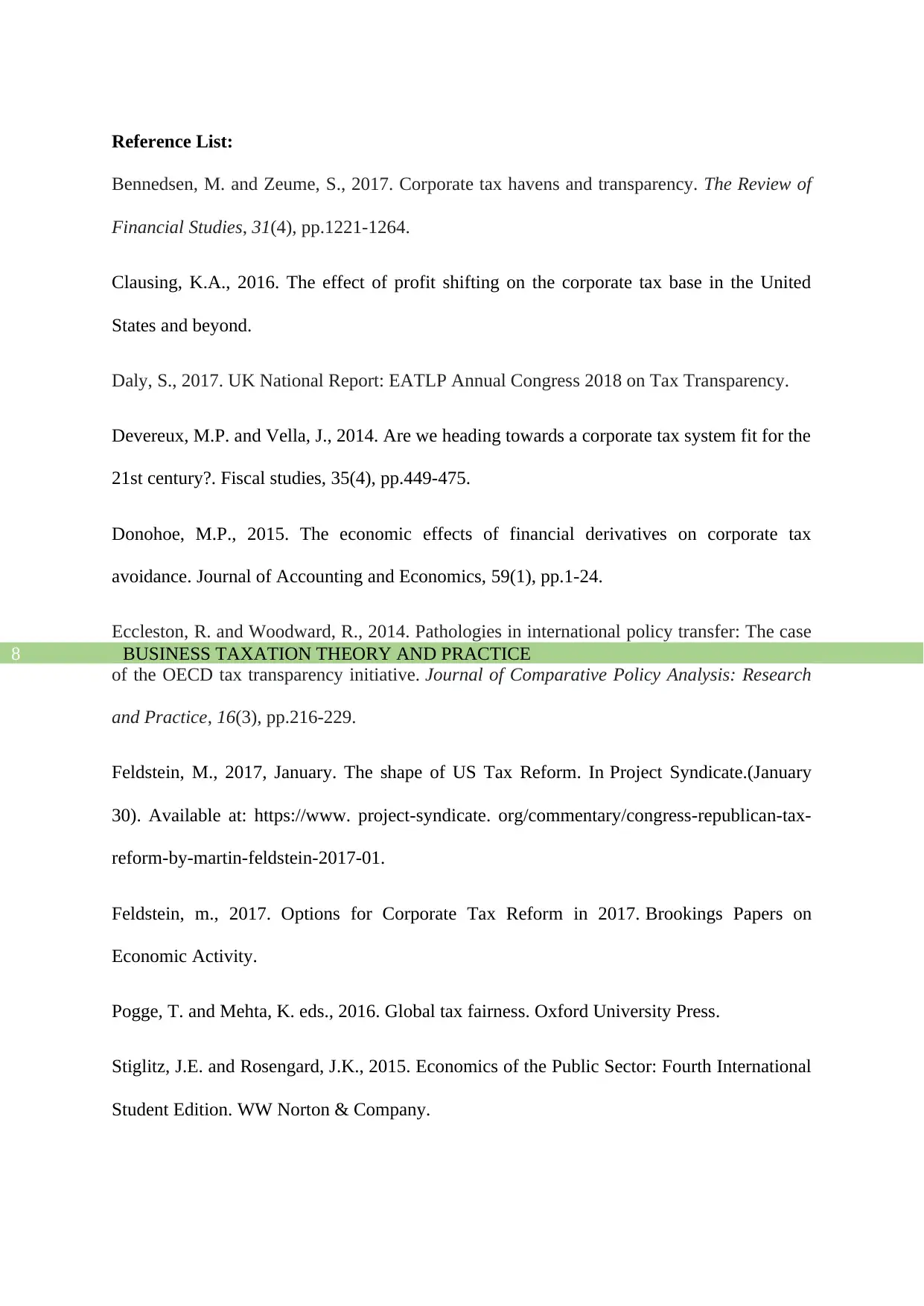
BUSINESS TAXATION THEORY AND PRACTICE8
Reference List:
Bennedsen, M. and Zeume, S., 2017. Corporate tax havens and transparency. The Review of
Financial Studies, 31(4), pp.1221-1264.
Clausing, K.A., 2016. The effect of profit shifting on the corporate tax base in the United
States and beyond.
Daly, S., 2017. UK National Report: EATLP Annual Congress 2018 on Tax Transparency.
Devereux, M.P. and Vella, J., 2014. Are we heading towards a corporate tax system fit for the
21st century?. Fiscal studies, 35(4), pp.449-475.
Donohoe, M.P., 2015. The economic effects of financial derivatives on corporate tax
avoidance. Journal of Accounting and Economics, 59(1), pp.1-24.
Eccleston, R. and Woodward, R., 2014. Pathologies in international policy transfer: The case
of the OECD tax transparency initiative. Journal of Comparative Policy Analysis: Research
and Practice, 16(3), pp.216-229.
Feldstein, M., 2017, January. The shape of US Tax Reform. In Project Syndicate.(January
30). Available at: https://www. project-syndicate. org/commentary/congress-republican-tax-
reform-by-martin-feldstein-2017-01.
Feldstein, m., 2017. Options for Corporate Tax Reform in 2017. Brookings Papers on
Economic Activity.
Pogge, T. and Mehta, K. eds., 2016. Global tax fairness. Oxford University Press.
Stiglitz, J.E. and Rosengard, J.K., 2015. Economics of the Public Sector: Fourth International
Student Edition. WW Norton & Company.
Reference List:
Bennedsen, M. and Zeume, S., 2017. Corporate tax havens and transparency. The Review of
Financial Studies, 31(4), pp.1221-1264.
Clausing, K.A., 2016. The effect of profit shifting on the corporate tax base in the United
States and beyond.
Daly, S., 2017. UK National Report: EATLP Annual Congress 2018 on Tax Transparency.
Devereux, M.P. and Vella, J., 2014. Are we heading towards a corporate tax system fit for the
21st century?. Fiscal studies, 35(4), pp.449-475.
Donohoe, M.P., 2015. The economic effects of financial derivatives on corporate tax
avoidance. Journal of Accounting and Economics, 59(1), pp.1-24.
Eccleston, R. and Woodward, R., 2014. Pathologies in international policy transfer: The case
of the OECD tax transparency initiative. Journal of Comparative Policy Analysis: Research
and Practice, 16(3), pp.216-229.
Feldstein, M., 2017, January. The shape of US Tax Reform. In Project Syndicate.(January
30). Available at: https://www. project-syndicate. org/commentary/congress-republican-tax-
reform-by-martin-feldstein-2017-01.
Feldstein, m., 2017. Options for Corporate Tax Reform in 2017. Brookings Papers on
Economic Activity.
Pogge, T. and Mehta, K. eds., 2016. Global tax fairness. Oxford University Press.
Stiglitz, J.E. and Rosengard, J.K., 2015. Economics of the Public Sector: Fourth International
Student Edition. WW Norton & Company.
⊘ This is a preview!⊘
Do you want full access?
Subscribe today to unlock all pages.

Trusted by 1+ million students worldwide
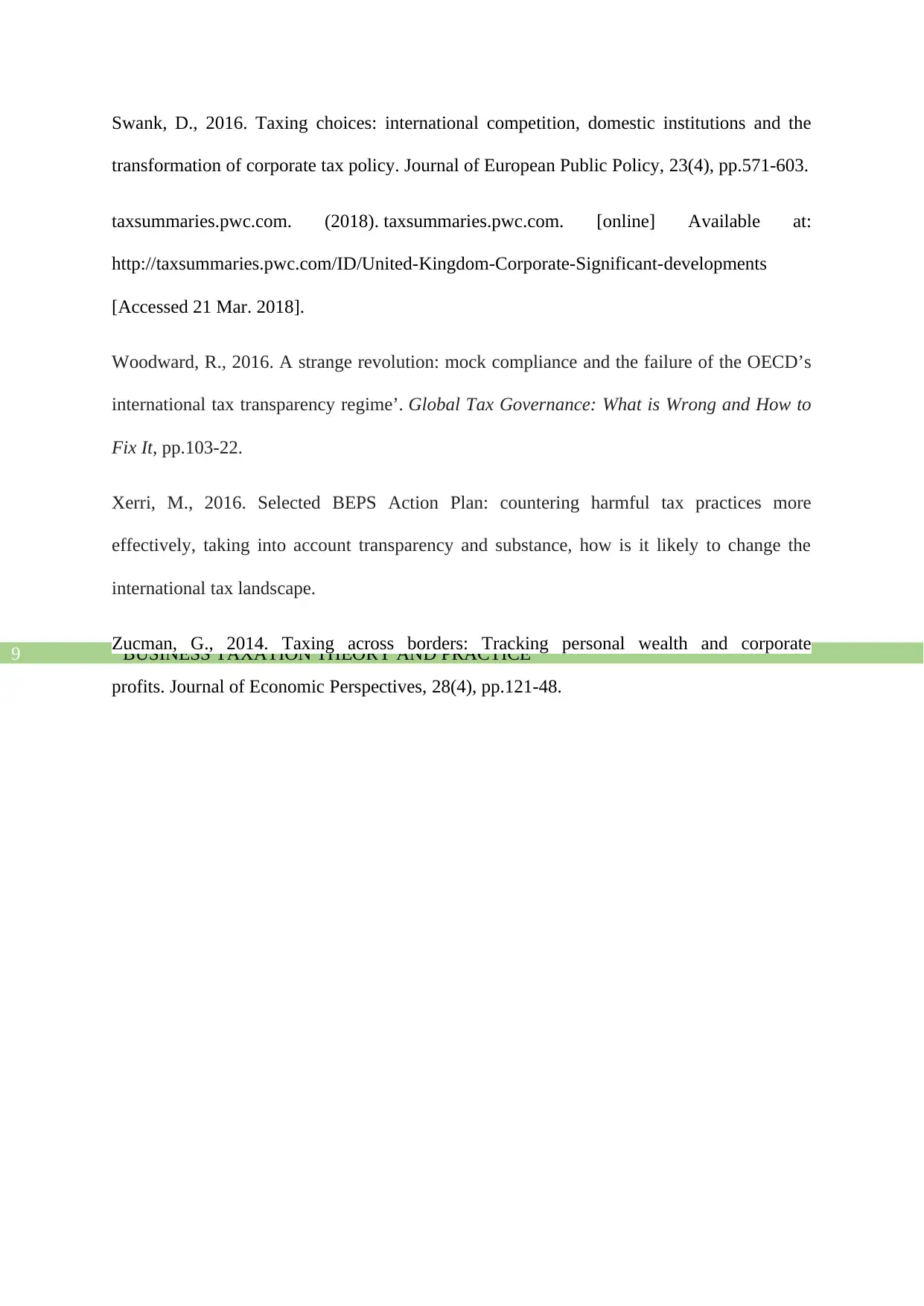
BUSINESS TAXATION THEORY AND PRACTICE9
Swank, D., 2016. Taxing choices: international competition, domestic institutions and the
transformation of corporate tax policy. Journal of European Public Policy, 23(4), pp.571-603.
taxsummaries.pwc.com. (2018). taxsummaries.pwc.com. [online] Available at:
http://taxsummaries.pwc.com/ID/United-Kingdom-Corporate-Significant-developments
[Accessed 21 Mar. 2018].
Woodward, R., 2016. A strange revolution: mock compliance and the failure of the OECD’s
international tax transparency regime’. Global Tax Governance: What is Wrong and How to
Fix It, pp.103-22.
Xerri, M., 2016. Selected BEPS Action Plan: countering harmful tax practices more
effectively, taking into account transparency and substance, how is it likely to change the
international tax landscape.
Zucman, G., 2014. Taxing across borders: Tracking personal wealth and corporate
profits. Journal of Economic Perspectives, 28(4), pp.121-48.
Swank, D., 2016. Taxing choices: international competition, domestic institutions and the
transformation of corporate tax policy. Journal of European Public Policy, 23(4), pp.571-603.
taxsummaries.pwc.com. (2018). taxsummaries.pwc.com. [online] Available at:
http://taxsummaries.pwc.com/ID/United-Kingdom-Corporate-Significant-developments
[Accessed 21 Mar. 2018].
Woodward, R., 2016. A strange revolution: mock compliance and the failure of the OECD’s
international tax transparency regime’. Global Tax Governance: What is Wrong and How to
Fix It, pp.103-22.
Xerri, M., 2016. Selected BEPS Action Plan: countering harmful tax practices more
effectively, taking into account transparency and substance, how is it likely to change the
international tax landscape.
Zucman, G., 2014. Taxing across borders: Tracking personal wealth and corporate
profits. Journal of Economic Perspectives, 28(4), pp.121-48.
1 out of 10
Related Documents
Your All-in-One AI-Powered Toolkit for Academic Success.
+13062052269
info@desklib.com
Available 24*7 on WhatsApp / Email
![[object Object]](/_next/static/media/star-bottom.7253800d.svg)
Unlock your academic potential
Copyright © 2020–2025 A2Z Services. All Rights Reserved. Developed and managed by ZUCOL.





